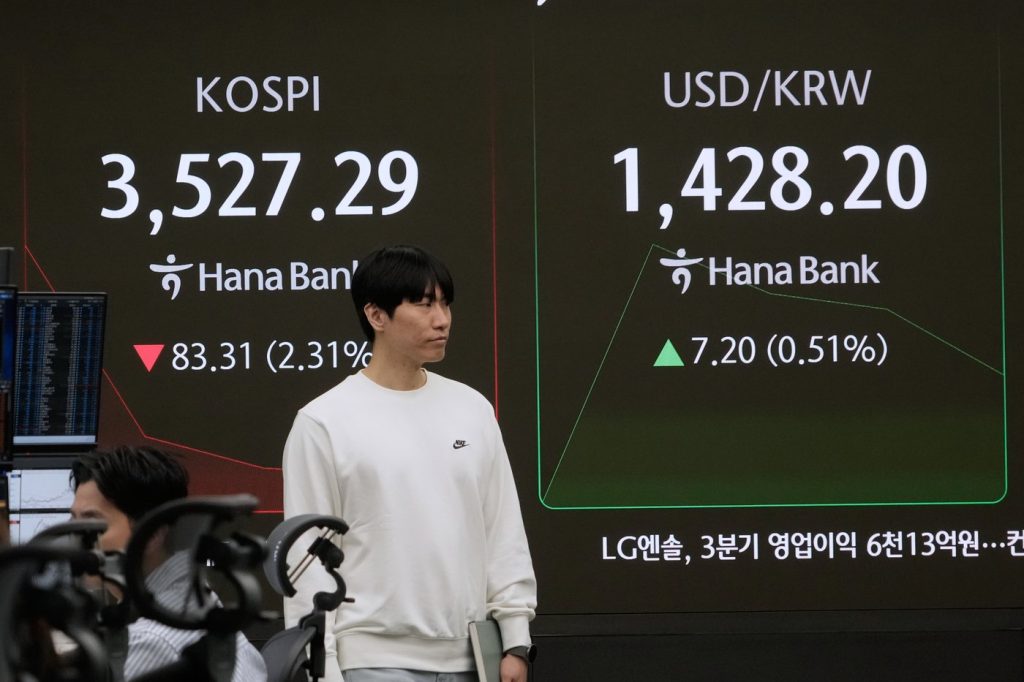BANGKOK (AP) - Asian shares saw a sharp decline on Monday as escalating trade tensions with China disrupted a prolonged period of stability on Wall Street. The sell-off came in the wake of U.S. stocks falling dramatically on Friday, after President Donald Trump threatened to raise tariffs on China in response to restrictions imposed by Beijing on rare earths exports, which are essential for the production of a wide range of products from consumer electronics to jet engines.
Despite the stock market turmoil, U.S. futures showed signs of recovery, with the contract for the S&P 500 rising by 1.2% and that for the Dow Jones Industrial Average up by 0.8%. Meanwhile, China reported an 8.3% increase in global exports for September, marking the strongest growth in half a year and indicating a shift in sales from the U.S. to other markets. However, exports to the U.S. plummeted by 27% year-on-year during the same period, highlighting the impact of the ongoing trade dispute.
In Hong Kong, the Hang Seng Index fell significantly, declining by 3.5% to close at 25,374.00. Most other major markets in the region also sustained losses exceeding 1%. China's Shanghai Composite index decreased by 1.3% to 3,846.25, while South Korea's Kospi index lost 1.7% to reach 3,550.32. Elsewhere, Australia’s S&P/ASX 200 dipped 0.9% to 8,882.60, Taiwan's Taiex fell by 1.7%, and India's Sensex lowered by 0.5%. Tokyo markets remained closed that day due to a public holiday.
On Friday, U.S. markets had their worst day since April, with the S&P 500 dropping 2.7% to close at 6,552.51. The Dow Jones Industrial Average decreased by 1.9%, finishing at 45,479.60, while the Nasdaq composite fell by 3.6% to 22,204.43. This downturn is attributed to indications of a re-escalation in the trade war between the U.S. and China.
President Trump expressed his frustration over the trade hostility on social media, mentioning that other countries have voiced their anger at the sudden increase in tensions. He implied that there may no longer be a reason for him to meet with Chinese President Xi Jinping, despite prior arrangements to do so during a trip to South Korea.
The overwhelming majority of stocks in the S&P 500 faced declines, with heavy losses noted among prominent tech companies such as Nvidia and Apple. The overall market appeared to be susceptible to a downturn, primarily because U.S. stocks had recently been criticized for their high valuations following a remarkable 35% gain since a low in April. Even with the fall in prices, the S&P 500 remains near its all-time high reached earlier in the month.
Concerns persist that the market is overvalued as stock prices have surged at a pace that outstrips corporate profit growth. There are heightened fears surrounding companies within the artificial intelligence sector, which some analysts liken to the 2000 dot-com bubble that eventually burst. For stocks to appear less expensive moving forward, either their prices must decrease or corporate profits must increase.
The oil market experienced notable fluctuations as well, with the price of a barrel of benchmark U.S. crude tumbling by 4.2% to $58.90. This decline was influenced by the ceasefire established between Israel and Hamas, which could alleviate concerns regarding potential disruptions to oil supplies. Additionally, Trump's tariff threats heighten worries that global trade might slow down, subsequently diminishing fuel demand.
Brent crude, the global benchmark, saw a decrease of 3.8%, closing at $62.73 per barrel. However, early Monday trading showed some recovery, with Brent crude at $63.65 per barrel, and U.S. benchmark crude rising 88 cents to $59.78. In the bond market, the yield on the 10-year Treasury fell to 4.05% from 4.14% late Thursday, reflecting prior declines influenced by a report from the University of Michigan indicating weak sentiment among U.S. consumers.
Additionally, early Monday trading indicated that the dollar fell to 151.87 Japanese yen compared to 151.89 yen late Friday, while the euro gained value, climbing to $1.1627 from $1.1614.











